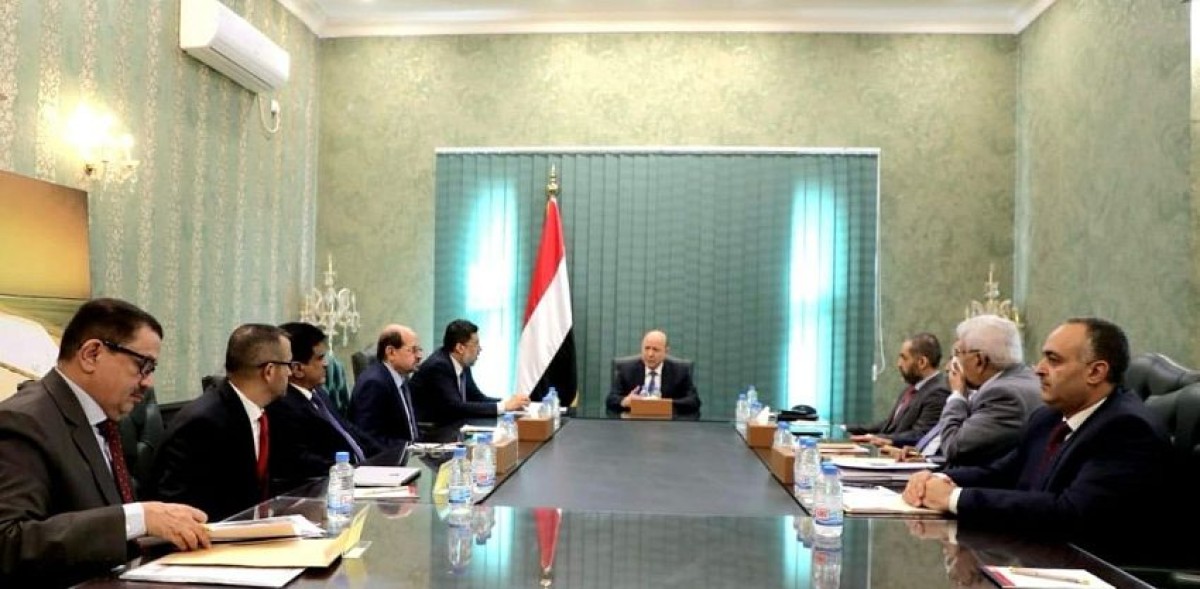The Presidential Council discusses an economic rescue plan.. Crisis Management Committee meeting


The Chairman of the Presidential Leadership Council in the capital, Aden, discussed economic scenarios and the necessary measures for economic stability, controlling exchange rates, and containing the risks of economic collapse.
The Chairman of the Presidential Leadership Council, Rashad Al-Alimi, urged to accelerate the implementation of the economic rescue plan, and to take measures and measures directed to enhance the efficiency of public finance management and monetary policy and limit the repercussions of the monetary division imposed by the Houthi militias as an economic war card.
This came during a meeting of the Chairman of the Presidential Leadership Council, on Thursday, at the Economic and Humanitarian Crisis Management Committee headed by Prime Minister Dr. Ahmed Awad bin Mubarak.
The meeting discussed existing and potential economic and humanitarian scenarios, and the necessary policies and measures to end monetary distortions, control exchange rates, and maintain economic, service, and commodity stability.
The meeting also touched on the importance of improving the state’s access to its public resources, ensuring the continued fulfillment of its imperative obligations, and proceeding with its comprehensive reforms supported by the regional and international communities.
The meeting provided President Al-Alimi with a brief briefing on the current economic situation, the measures required to control inflation, the general budget deficit, and price fluctuations in the exchange markets, and basic goods and services.
The briefing included economic, financial and monetary indicators, and the recent changes in the position of the national currency in light of the continued cessation of oil exports, the rise in maritime shipping prices and their disastrous repercussions on living conditions, which were exacerbated by the terrorist attacks of the Houthi militias supported by the Iranian regime.
The challenges facing Yemen Airways Company as a result of the Houthi militia’s continued hijacking of a number of the company’s aircraft and the confiscation of its funds and the risks posed to the national carrier by these arbitrary practices were also discussed.
Al-Alimi appreciated the efforts of the coalition to support legitimacy led by the Kingdom of Saudi Arabia and the United Arab Emirates, through economic, development and humanitarian support, which Al-Alimi considered to have a decisive role in the state’s continued fulfillment of its imperative obligations, and alleviating the humanitarian suffering of the Yemeni people.
On Tuesday, the Chairman of the Leadership Council, Rashad Al-Alimi, met with the US Ambassador to Yemen, to discuss the government’s support to save the national currency and contain the repercussions of the economic crisis.
Alimi also discussed with the American ambassador containing the repercussions of stopping oil exports as a result of militia attacks on oil ports.
The Central Bank announced, as an emergency measure to limit the collapse of the currency, during the past few days, the opening of an auction to sell $50 million, on Sunday, October 20, to confront the increased demand for foreign currency.
In recent days, the exchange rate of the US dollar against the Yemeni riyal exceeded the barrier of 2,000 riyals for every one dollar, casting a negative shadow on the inflation of the prices of goods and foodstuffs, and the collapse of the purchasing power of citizens.